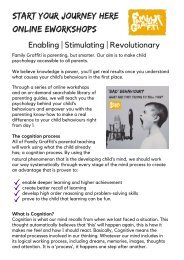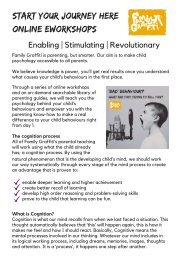Create successful ePaper yourself
Turn your PDF publications into a flip-book with our unique Google optimized e-Paper software.
Ever<br />
Evolving<br />
Morris Barnes<br />
Family Graffiti<br />
£3<br />
Inside every behaviour is a child struggling to behave
"I was born thinking<br />
what is it that you want me to<br />
learn?"<br />
First edition published in 2018<br />
copyright @ 2017 Family Graffiti Limited
Introduction<br />
Your Revolution<br />
To change a behaviour we must first understand its meaning. Poor behaviour in<br />
childhood is usually an undeveloped understanding of expectation.<br />
What children think, how they feel and what they believe is their goal, this is<br />
what they practice. Sometimes learnt from others, by miss-interpretation, or<br />
maybe handicap, but rarely ever by calculated choice.<br />
No child is born bad, it is nurture that creates all behaviour. No child is<br />
intentionally naughty and No amount of punishment will alter behaviour, better<br />
learning will...<br />
Our theory<br />
Inside every behaviour is a Child struggling to behave. No blaming or shaming,<br />
just simple understanding.<br />
"I was born thinking so what is it that you want me to learn?"<br />
Cognitive Reasoning is how thinking and feelings work together in an everevolving<br />
mind and that can be reframed with love. Children are instinctive<br />
learners and have a natural drive to achieve the 'best' place that they can to<br />
satisfy their needs. Poor behaviour reflects a confused mind state, so we need to<br />
replace confusion with clarity and then let the Child learn how best to 'do it' for<br />
themselves.<br />
Ever evolving<br />
It is time to evolve our understanding of best parenting! Our Children's world is<br />
ever evolving and our knowledge of behaviour has moved on. Science has<br />
proven that some Child experts should have a 'best before date'!!!<br />
Understand how your Child's reasoning works and how to avoid the pitfalls. Don't<br />
rely on 'past' generations of belief and choose to make some time in your busy<br />
lives to evolve your understanding of parenting for your Child, It will be worth<br />
the investment.
1. Mindset and motivation<br />
We all know that children have an ability the see things and events around them<br />
from a ‘new’ mindset. This often shows surprising maturity and simple clarity.<br />
Their thinking may not be to the preferred ‘norm’ that you expect. They much<br />
prefer an orderly, constructive and even perhaps a challenging environment in<br />
which to thrive. This is how they retain a calm security to form their own basic<br />
theories of life expectancies and achievement. The Adult, however, often reacts<br />
with real anger or frustration and ‘punishment’ is at the forefront.<br />
Any child’s mindset should be supported by a calm and loving attachment. They<br />
need a simplistic factual communication style and a routine systemic timetable. In<br />
doing this, parents are giving their children the best opportunity to create a<br />
naturally advancing mindset for themselves. We embolden them to become selfmotivated<br />
learners who know how to achieve their immediate needs. They will<br />
learn how to problem solve and how to deal with setbacks without disillusion.<br />
Calm and Considerate, Patience and Persistence. The Child will learn this same<br />
mindset.<br />
"calm voices<br />
calm choices<br />
calm children"
2. The worst?<br />
Why do adults always assume the worst?<br />
Why do we Adults always assume the most ‘drastic’ of intent and illogical<br />
reasoning from a child in a tantrum? For the child, often the simplest of<br />
occurrence can trigger anxiety, frustration, fear and reaction. They have not<br />
been taught how better to react cognitively, so they display “Upset”.<br />
They are confused, fearful and don’t know how better to let you know “I am not<br />
happy with this situation”.<br />
Kids are self-centred by nature and they will have only their thought of “how can<br />
I get something that I want?” Which to the Child, usually means “how can I<br />
control this horrible feeling that is attached to this event?” or “How can I let the<br />
Adult know that I am not happy?”.....<br />
.....I know, I’ll scream.<br />
Of the child’s tantrum display and your own pre-reaction ask yourself, What is<br />
the Child really trying to achieve? What should I be trying to achieve in this<br />
situation? What is it that the Child wants to communicate and how should I be<br />
responding?”<br />
Think: If I were in the Child’s situation, what is it that I would most like the Adult<br />
to give me?<br />
“Work hard to find the diamonds on the beach.<br />
The beach is covered with billions and billions of<br />
tons of sand.<br />
Each grain glitters and gleams in the sun.<br />
The tide floods in and dulls the lay.<br />
How many, I wonder, did we miss today?”<br />
Search for the asset strengths that lie inside your child,<br />
not the behaviour that troubles them.
3. Positivity<br />
We all have the ability to achieve!<br />
Do not scold the Child for poor displays, simply show them a better way to<br />
achieve.<br />
The real answer to the Child’s difficulty is likely to be quite mundane and easily<br />
achievable.<br />
Create a communication pathway that provides an opportunity for resolve, not<br />
punishment.<br />
Create a pathway for the Child’s ability to grow, do not expect this to be an<br />
“inherited” skill, it can be taught. Do not limit the child with your own mindset, or<br />
typical ‘norm’ reactions.<br />
The Child is an instinctive learner, as are most adults. Learn to recognise “new”<br />
ways, outside of the ’norm’. The Child is trying to lead the way for you to be more<br />
creative and more positive.<br />
... Ever Evolving
4. Cognition<br />
I was born thinking and with feelings, so what is it that you want me to learn?<br />
We know that all newborns have the ability to remember. We also know that they<br />
will record information and store it, for later recall. This is called the Cognitive<br />
process.<br />
Children have feelings and these develop maturity in their very early childhood<br />
stages. They recognise ‘good’ and ‘bad’ sensations.<br />
When a child has mastered the task of allying their memories with their feelings,<br />
they can make judgements on how they feel in any ‘happening’ situation. This is<br />
called Cognitive Reasoning.<br />
Kids don't have to understand why the act and the feeling go together. They just<br />
associate them by their experience. It isn’t a decision-making process, they don't<br />
know what makes a different action more appealing.<br />
It takes more development and experience for the Child (3 plus years) to make<br />
reasoned choices, using this Cognitive Reasoning to decide what action to take.<br />
Before that, their cognitive reasoning is only an instinctive memory reaction<br />
based on recognized feelings. Now they can start to distinguish which<br />
memory/feelings combination that they can depend on to achieve a certain result<br />
The Cognitive Process:<br />
1. Receive information (messages recorded)<br />
2. Retain information (messages remembered)<br />
... Ever Evolving<br />
3. Recall information (messages associated with an event or action)<br />
4. React to this information (how the message and<br />
allied feelings present in behaviour).
5. Fear<br />
There is no greater deterrent to learning than the fear of making a mistake.<br />
Take away the fear, don’t scold the child or punish them every time they make an<br />
effort and fail to achieve. It is the “effort to try” that is the most important part of<br />
learning and develops resolve, rather than any actual achievement.<br />
If we unintentionally cause the Child to fear trying, because failure always leads<br />
to their punishment or humiliation, they will fear trying and avoid new efforts to<br />
improve. But, if we encourage their effort and explain the missed outcome, they<br />
will make the effort again.<br />
It is by making mistakes that we learn most. So let them make a mistake, then<br />
encourage them to look for a different decision route, let them discover the<br />
enjoyment of searching for and discovering an alternative route, hopefully with<br />
new outcomes.<br />
“Schooling” is now so conditioned to ‘achievement’. Whether it be SATS or school<br />
reviews. Systemic, government focused credit (and the fear of failing), drives our<br />
teachers and our schools to focus on inept and outmoded teaching practices, it’s<br />
all about the result for them.<br />
Parenting should not fall into this category. It should be about “what and how”<br />
can this child best learn? Parents have the power to change how their child learns<br />
best. They can change their child’s world by working with and advocating for the<br />
Child’s best asset development opportunity: their Cognitive Reasoning ability.<br />
Science has proved it, let them do the learning.<br />
... Ever Evolving
6. Boundaries<br />
Setting boundary expectations<br />
We know that children thrive best when learning within secure and sound<br />
boundary expectations. They enjoy the freedom to explore and the risk of<br />
adventure, within these safe boundary expectations.<br />
Children will challenge these boundaries from time to time. This is not behaviour<br />
made by a calculated choice to be naughty, it is most likely the child’s naive<br />
attempt to develop an understanding of the limits and the flexibility of these<br />
boundary expectations.<br />
It is perhaps the child’s curiosity.<br />
They are seeking to learn just how far they can go. When you are setting<br />
boundaries be sure of what you want them to learn and when they ‘stretch’ the<br />
space that they operate within you must know beforehand how much tolerance<br />
you will allow. Because they will ‘push it’.<br />
Parents need to set ‘outer limits’ of their expectations, and ‘inner limits’ for the<br />
child to push against. The ‘limit’ allowance being the bit that will not annoy you too<br />
much if they do test you, without compromising their other good efforts.<br />
For example, bedtime rule: 8.45 upstairs, clean teeth, PJ’s on for in bed with eyes<br />
closed for 9 pm, cos morning comes round quicker that way. What if at 8.45, they<br />
say goodnight and go to their routine without prompting but are not in bed and<br />
quiet until 9.10? Is this a ‘failure to achieve’ or 'rewarded as good effort?'<br />
The same expectancy boundaries should apply to all behaviours, where the child<br />
can make an effort (and perhaps fail) of their cognition. Do not be so restrictive in<br />
your expectations that you strangle the ‘effort input’. This is the part that is key to<br />
their learning.<br />
... Ever Evolving
7. Limiters<br />
Apart from Safety issues, the only other limiters on a child’s learning, are<br />
the ‘Teachers’.<br />
Teachers include Parents, peers, wider families and friends, teaching<br />
professionals, care workers, societies ‘do-gooders’, even TV, webby stuff, books.<br />
We are all teachers. Anyone who the Child can mimic or learn from.<br />
Of course, there is no such thing as ‘the Perfect Parent', ‘a perfect child’ or ‘a<br />
perfect world’. We none of us are ‘perfect’ and society is certainly not. Even<br />
Morris and Nik have their explosive tantrums and over ‘exuberant to depressive’<br />
mood swings (especially Morris). But WE CAN TRY! It is the opportunity to try, the<br />
effort to try, the limitless opportunities to try, the willingness to try, to fail and to<br />
try again, to try to improve our understanding, to try to help others.<br />
There should be no limiters that interfere with our natural intrinsic willingness to<br />
learn.<br />
Children work well within invisible boundary tolerances, rather than rigid limits.<br />
They instinctively come to know what is expected and what is not tolerated.<br />
Instead of ‘boundary setting’, try communication. Try not to set “what not to do<br />
boundaries” (these are restrictive). Try to instil an appreciation of where the child<br />
can venture unchallenged, and encourage them to take that route.<br />
Let them be creative and searching. If they learn something inappropriate (to<br />
societies ‘norm’), then explain a better choice that could be made in the future.<br />
Don't say ‘No’ to their first learning. They do have an intrinsic ability to seek the<br />
better place for them to achieve their own goals, and NO will be seen as a<br />
challenge worth looking at to them. Let them choose the new route, they will soon<br />
accept it as their own learning.<br />
... Ever Evolving
8. Scheduling<br />
Scheduling to give your child peace of mind.<br />
We know that children respond better to regular scheduling and timetables. To<br />
varying degrees, it is their comfort zone of expected conformity.<br />
Each to their own degree, children love orderly, Factual, Evidenced, Regular<br />
conformity and Participative Routine. This could be their normal day eating &<br />
sleeping schedules, or simple play times. No matter the communication and<br />
learning styles, kids love conformity. It can all seem pretty mundane to an adult,<br />
but to a child, it is cherished.<br />
Most Children love ‘pigeon-holing’ their own facts, they almost have a<br />
constitutional need for fact and factual. In early years in particular (0-7years)<br />
they are unable to take things on faith. Just because you would like them to<br />
believe something, doesn’t mean they will. Kids need to see it, be part of it and it<br />
needs to be actual. Making imaginative promised rewards for the future is rather<br />
futile.<br />
Immediate recognition and praise for an act just being committed is far more<br />
influential. It is here, now, in the present. They can ally this praise with an action<br />
or effort that they are making, in the present. It all hangs together for them and it<br />
makes sense (and 'cognitively' this will be their recall data).<br />
So, if a Child’s 'asset strength needs' are to have facts tidily packaged and<br />
presented in their daily activity. Use this ‘natural need’, to their and your<br />
advantage.<br />
... Ever Evolving
9. Conformity<br />
Regulate bedtimes & wake up times, meal times & learning times, attending times<br />
& free Play times, School times & Rest times. etc. etc. This helps teach selfregulation.<br />
Children will anticipate the end of a particular activity period, and<br />
prepare for the next (handy for when it comes to them self-regulating IPad<br />
games/TV times).<br />
Make weekends and school holidays keep as close a possible to the same routine<br />
as every other day. Build in regular 'me only' times. This respite from each other is<br />
very important for both of you.<br />
Do not be pedantic with your timekeeping, but be as consistent as practical (and<br />
don’t miss a ‘story reading time’). Kids will embrace the conformity, it will add a<br />
security of order to their lives. They will find it rewarding & they will stick to it<br />
better than you will!<br />
Do not insist that your child ‘acts like anyone else’. They won’t. Kids need their<br />
own existence to suit their own unique needs and their own particular routine.<br />
Having a regular timetable also encourages self-regulation. It shows that there<br />
are certain periods of time allocated to each activity, and then, you finish and<br />
move onto the next (planting the seeds). If we parents have to become a little<br />
more 'discipline' in our own routine, then so be it… It isn’t a crime! It can be a<br />
blessing. Because this is how the Child is naturally conditioned to think, in their<br />
early years (0-7years), it will satisfy their basic need for separated attention and<br />
learning times. They will develop their own basic satisfaction, they will find this<br />
rewarding. Children will respond to it.<br />
Kids will add their own creativity and challenges inside this timetabling. Less fear<br />
of the unknown and less frustrated by learning that is out of their immediate<br />
reach. They will be less reliant upon adult company and much more able to make<br />
sense of their own immediate world because ... Ever it keeps Evolving<br />
repeating (habit forming,<br />
each to their own degree)...
10. Born a learner<br />
Always a learner.<br />
Does perfect, understanding parenting always equal perfect children?<br />
Learning doesn’t always mean mimicked or copied. Sometimes a child’s mind<br />
works; two plus two equals five, or seven, or something really random.<br />
Parents will always be in the dark when it comes to understanding a child’s logic<br />
of behaviour. It’s confusing for kids and confusing to us. This is the first thing we<br />
have to understand: Perfect Parents cannot fully understand their Child. We can<br />
only get a good sketch of what they are trying to achieve and why they are<br />
expressing themselves in this meltdown way!<br />
“Work hard to find the diamonds on the beach.<br />
The beach is covered with billions and billions<br />
of tons of sand.<br />
Each grain glitters and gleams in the sun.<br />
The tide floods in and dulls the lay.<br />
How many, I wonder, did we miss today?”
11. Metacognition<br />
Metacognition is a big word for something that we all do every day, without even<br />
thinking about it. “Thinking about our thinking” (metacognition) is what creates<br />
our perspective on things. (Family Graffiti call this: Cognitive Reasoning). It is how<br />
we use our insight, our reflecting and our thinking to gain an understanding of<br />
our feelings, needs and behaviours.<br />
In early years (0-3years): A child’s mind is essentially a recording device. It<br />
captures everything. Early years needs are simple; to be fed, to be warm, to feel<br />
safe, to be loved, to sleep etc. And record everything that happens around them.<br />
In developing years (3-7years): A child’s mind starts to learn, manage and adapt<br />
their recordings and ally their recorded thoughts with feelings and sensations.<br />
They adapt to new learning and have a better understanding of experiences,<br />
challenges and setbacks (upsets). Their needs become more demanding and more<br />
urgent. They are having a running, confusing conversation in their heads. Still<br />
recording, starting to reason (but which reaction is the right one?), starting to<br />
have developed needs, still self-centred in their wants and becoming bigger,<br />
stronger, louder. The thought patterns that the Child develops during this period,<br />
can set their mindset for years to come. It will set their future behaviour and<br />
learning capabilities.<br />
So now, (3-7years): Is when we parents need to be pro-active in our teaching.<br />
The Child’s mind may be confused but it is still very malleable, it can be reframed,<br />
it can be helped to recognize the ‘better’ strategies, and made to<br />
understand how to achieve their ‘wants and needs’ without a tantrum. Once<br />
Parents have planted the ‘learning seed’, it will continue to flourish, if it is<br />
encouraged too!<br />
Planting the (metacognitive) learning seed, will enable the Child to develop a<br />
natural mindset which is still growing, still learning, still striving for goals. But they<br />
need a gentle ongoing process of positive conditioning to keep their cognitive<br />
reasoning on track. Better cognitive training at this age (3-7years), develops<br />
better learning strategies, less anxiety, less frustration, better self-esteem, better<br />
self-regulation, improved belief and effort to achieve, better behaviour, all<br />
around the mechanics for building a brighter future.
12. Metacognition training<br />
All Family Graffiti strategies include an element of metacognition. Asking<br />
the Child “to use what they have – a ready functioning learning system”.<br />
Enable the child to think about the triggers that caused an incident. Let them<br />
explain to you what it was they were trying to achieve? Don’t Blame, or Shame,<br />
simply encourage them to tell you their story and try to understand it. This will<br />
encourage them to reflect (think back), using their own thinking process.<br />
Take away the element of fear from the acting out behaviour and from the<br />
storytelling. You need to encourage a solution-focused thinking process, not one<br />
of punishment and reprisal.<br />
Then encourage them to think about what they would want you (the parent) to do<br />
to help them achieve their intended goal. And if their response is appropriate, do<br />
it. Show them that their calm, talking process, works to achieve goals, better than<br />
their acting out behaviours.<br />
Ask them, “Would you remember how to handle things differently next time?”<br />
(Ensuring that the learning seed is firmly planted).<br />
Tell the Child “it’s your better-thinking process that gives you good outcomes”.<br />
(Use your own age-appropriate words).<br />
Tell them “that next time you can feel a tantrum coming on, ask me for the answer<br />
first. Then we can work it out together”, (when they do approach you, set time<br />
aside for them immediately and let them do the talking and thinking, you just use<br />
guiding comments). Remember a good teacher shows where to look, not what to<br />
find.<br />
Be Patient. There is no instant miracle… This is a whole new learning process<br />
you are trying to instil, it will take time and there may be setbacks. Be<br />
persistent and consistent and always, always patient.<br />
Morris<br />
xx
About the author<br />
Morris Barnes and his son Nick Barnes launched their online business Family<br />
Graffiti in late 2015.<br />
With a mixture of wisdom, experience and enthusiasm, Family Graffiti was<br />
created to provide parents with psychological guidance and support in the<br />
comfort of their own home. Family Graffiti has also been set up to help fund a<br />
retreat in France designed to offer respite care… a holiday for parents and a<br />
therapeutic experience for children.<br />
Morris<br />
&<br />
Nick<br />
Family Graffiti is completely different to<br />
any child therapy advice website you<br />
will have been on, and that’s exactly<br />
how they want it to be.<br />
Morris' parenting techniques are based<br />
on years of qualified experience in social<br />
care, psychology, childcare lecturing,<br />
parenting and therapeutic foster care.<br />
Watching, listening, assessing and<br />
caring.<br />
Family Graffiti is built on the principle that children’s minds have instinctive<br />
learning processors and that good cognition feeds their need for knowledge and<br />
mental growth. Good cognition can be created in healthy minds, inspiring an<br />
amazing happy child.<br />
They believe that It is parenting that influences development the most and that<br />
creates the person that the child will become. Learning is most influential when<br />
made during early years, but early failings can be repaired at any stage of<br />
developing life providing the recipient is prepared to seek change.<br />
www.familygraffiti.co.uk<br />
Reinvent your parenting technique
Siblings<br />
Coping with<br />
change<br />
Anxiety<br />
www.familygraffiti.co.uk<br />
Reinvent your parenting<br />
technique<br />
Communicating<br />
For dads too...<br />
copyright @ 2017 Family Graffiti Limited









